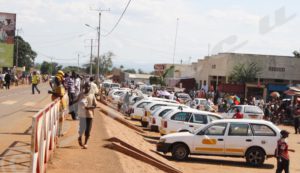The medical personnel on the Burundi-DRC border denounce the lack of equipment to detect and fight against Ebola.

A boat crossing the Rusizi River towards Mparambo border
At a beautiful sunset, a boat arrives from the Democratic Republic of Congo on Mparambo border, in north-west of Burundi, via the Rusizi River. A dozen of passengers get off with their luggage. They wash their hands at a nearby tap and then pass in front of a nurse who measures their temperature with a thermometer before going to the officers of the customs service and border protection to register.
The nurse has no gloves, apron, boot or respiratory protection masks. “We do not have equipment to protect us.” He calls on health authorities to equip them with protective equipment. “We will be the first to be infected in case there is an Ebola outbreak in Burundi”. He indicates that an average of 50 passengers cross this border to Burundi every day. To date, he says no case of Ebola patient has been detected on this border.
The local population is also worried. Solange Ngabirano, a resident of Mparambo area, says that if a case of Ebola is detected; all people living near the border will be infected. “There is no ambulance here on the border to carry someone who would have contracted Ebola to the hospital. Prior to being transferred to an Ebola testing center, the patient would have infected the entire community”. She also regrets that the road leading to the border is not passable for vehicles.
“The patient would have to walk more than a kilometer to reach the main road, which is dangerous for all of us.” She asks the government to solve those problems.
Berchmans Nshimirimana, another resident of Mparambo area, demands that the number of nurses on the border be multiplied: “I often see one nurse on the border. If one day he detects a case of Ebola, he will not be able to rescue them alone and take them to the Ebola treatment center.” He also notes that “the road is in very bad condition and that there are no vehicles to carry the sick to the hospital”.
Pascal Harerimana, an employee at Rubenga border in Rugombo commune, says no case of Ebola has been reported so far.
He, however, regrets that medical equipment is not sufficient to protect the surrounding population as well as nurses posted on the border. He urges the health authorities to make vehicles available on the points of entry to quickly rescue those who would be affected by Ebola virus and thereby prevent it from spreading.
Fear grips residents of Rugombo commune

The center of Rugombo where there is a strong economic activity
People living near the Burundi-DRC border, in Rugombo commune of Cibitoke province are gripped by fear. They are afraid of catching the Ebola virus following movements of the population from the DRC. They say that Rugombo is at risk. K. J., a resident, assures that the bulk of these movements are made via illegal borders. “Thus, passengers entering Burundi via Buganda border are not examined.”
Antoine Sindayigaya, Provincial Health Director says all necessary measures have been taken to contain Ebola outbreak. “The ministry has made medical equipment available to detect whoever has this virus.” He warns that “nurses who do not pull on equipment for personal protection will be punished.”
Last week, the Ministry of Health organized an awareness campaign for the population of Cibitoke on Ebola virus that is rampant in the province of North Kivu in DRC, 400 km from Bujumbura. Burundi is in the forecast phase, according to health officials.
In August 2018, Burundi reduced points of entry with the DRC to 11. Temporary structures (tents) have been installed to provide basic care for Ebola patients.



















 IWACU Open Data
IWACU Open Data

